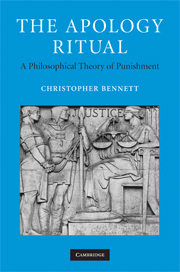2 - Some retributivist themes
Published online by Cambridge University Press: 22 September 2009
Summary
So far we have introduced the problem of the justification of punishment, paying particular attention to the problems associated with instrumentalist or consequentialist justifications, and have introduced restorative justice as an alternative to punishment. In this chapter we will look at some of the problems and prospects of retributive justifications. Our aim here is not so much a comprehensive overview or survey of retributivism, as an attempt to draw out some promising themes that retributivists have appealed to in attempting to explain their point of view. I will claim that there is a way of weaving these themes together that gives us a satisfying and attractive understanding of what is meant by retribution and why it is important. I will explore this approach, which leads us in the direction of an account of blame, apology and atonement, in part II of this book. What I want to do at the moment is to close this introductory part I by taking a preliminary look at some of the ideas I will be working with. Though not adequate as they stand, I will argue that each has an element of truth that bears further exploration.
the problems of retribution
As we have seen previously, what defines the retributive tradition is the idea that individual culpability is something that in itself (independently of further consequences) calls for a response, and that this response has to involve the offender undergoing hard treatment.
- Type
- Chapter
- Information
- The Apology RitualA Philosophical Theory of Punishment, pp. 26 - 44Publisher: Cambridge University PressPrint publication year: 2008
- 1
- Cited by



